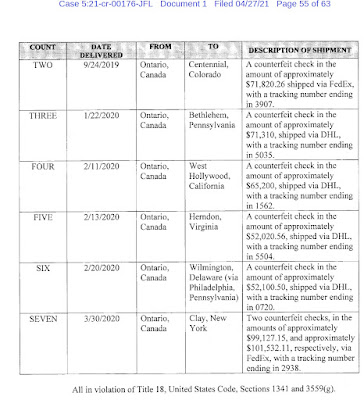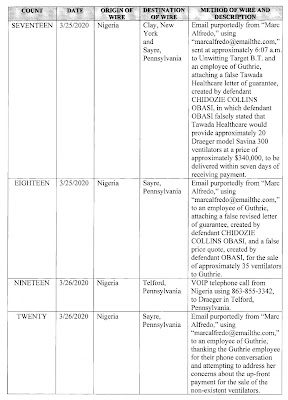TL;DR? Good news! I read them for you!
On 15SEP2022, the Department of Justice released their report "The Role of Law Enforcement in Detecting, Investigating, and Prosecuting Criminal Activity Related to Digital Assets" (66 pages). The first of the nine reports ordered by President Biden's Executive Order 14067 "Ensuring Responsible Development of Digital Assets" was also released by the DOJ back on 06JUN2022, "How To Strengthen International Law Enforcement Cooperation for Detecting, Investigating, and Prosecuting Criminal Activity Related to Digital Assets" (58 pages).
Since then, we have seen the Department of Treasury release three reports:
- "Action Plan to Address Illicit Financing Risks of Digital Assets" (20 pages),
- "Crypto-Assets: Implications for Consumers, Investors, and Businesses" (58 pages),
- "The Future of Money and Payments" (56 pages)
Treasury also provided to the White House in July a "Framework for International Engagement on Digital Assets" which is described in their press release, but not provided to the public.
Earlier this month, the Department of Commerce released their report:
"Responsible Advancement of US Competitiveness in Digital Assets" (19 pages).
The Office of Science & Technology Policy also released three reports:
- "Technical Evaluation for a US Central Bank Digital Currency System" (58 pages)
- "Climate and Energy Implications of Crypto-Assets in the United States" (46 pages)
- "Technical Design Choices for a US Central Bank Digital Currency System" (33 pages).
The Role of Law Enforcement in Digital Assets
- financial transactions associated with the commission of crimes, such as buying and selling drugs or weapons, leasing servers used in the commission of cybercrime, soliciting funds to support terrorist activity, or ransom, blackmail and extortion.
- money laundering and the shielding of legitimate activity from tax, reporting, sanctions, or other legal requirements, including operating unlicensed, unregistered, or non-compliant exchanges.
- crimes, such as theft, directly implicating the cryptocurrency marketplace itself, such as stealing cryptocurrency from exchanges or defrauding unwitting investors.
Section II of the report discusses DOJ efforts such as the National Crypto Enforcement Team (NCET) and its predecessors such as the Money Laundering and Asset Recovery Section's Digital Currency Initiative, and the Internation Virtual Currency Initiative. A few interesting statistics from the FBI, including that as of July 2022, the FBI had worked 1,100 separate investigations across 100 investigative program categories that involved a digital assets nexus. Since their first digital assets seizure in 2014, the FBI has seized $427 million in virtual assets (as valued at time of seizure.) In February 2022, the FBI created the Virtual Assets Unit. The Department of Justice has also created a Digital Asset Coordinators Network which is composed of designated prosecutors in U.S. Attorney's Offices across the country who work closely with CCIPS, MLARS, and NCET. The program is based on the successful CHIP Network (Computer Hacking and Intellectual Property) and the National Security Cyber Specialist (NSCS) Network which each designate prosecutors in every field office to be specially trained and equipped to handle the relevant case types for their office.
Regulatory Agencies also play their part, with FinCEN working to enforce Bank Secrecy Act (BSA) guidelines and regulations related to Anti-Money Laundering and Countering Financing of Terrorism (AML/CFT) requirements. Treasury manages the OFAC office, which includes sanctioning mixer and state-sponsored crypto hackers. The SEC regulates crypto scams that are structured as "investment contracts, such as BlockFi Lending LLC or the DeFi Money Market. The Commodity Futures Trading Commission (CFTC) regulates the trade of commodities in interstate commerce. They have brought 50+ enforcement actions against organizations such as Coinbase, Payward Ventures (Kraken), Blockratize (Polymarket). BitMEX is one cryptocurrency derivatives exchange targeted for CFTC enforcement, after $209 Million in darknet market transactions were cashed out via BitMEX, who paid a $100 Million fine, with three co-founders pleading guilty to criminal charges and paying a $10 million fine.
Requests for Legislation
The Justice report does make several requests for additional legislation, in five categories:- extend the prohibition against disclosing subpoenas (currently in effect for financial institutions) to VASPs (Virtual Asset Service Providers), strengthen the laws against operating an unlicensed money transmitting business, and extend the statutes of limitations from 5 to 10 years for certain crimes.
- support for initiatives that would aid investigators in gathering evidence
- strengthening sentencing guidelines for certain BSA violations
- extend BSA record keeping rules to VASPs
- ensuring that law enforcement has resources to conduct and staff sophisticated digital asset-related investigations.
International Considerations
BTC-e











